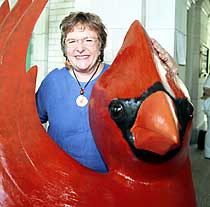Those shoes are big, green and hard to fill.
The city is undertaking a nationwide search to replace retiring Prospect Park administrator Tupper Thomas, who spent the last 30 years turning the park from a once-great urban oasis marred by syringes, graffiti and crack vials into one filled with dog runs, bucolic green meadows, millions of visitors and … the occasional crack vial.
Thomas, 65, joked that her successor’s resume will have to be much more impressive than hers when she landed the gig back in 1980.
“If I’d been offered today’s job [of park administrator] when I was 35, I wouldn’t have been qualified,” she said. “I grew into it.”
Now she’s leaving the biggest power — and park — vacuum since the retirement of Robert Moses.

Finding a replacement will be difficult because of Thomas’s achievements, which restored Olmsted and Vaux’s 19th-century vision of a natural haven of rolling hills and wooded areas, a vision that had been lost in the fiscal crises of the 1970s.
Today, the park is a vibrant public area considered the heart and lungs of Brooklyn. Many believe that Thomas’s indefatigable effort actually stopped the rotation of Olmsted and Vaux in their respective graves.
“I wanted to make sure people from every income level and every culture felt welcome in the park,” Thomas told The Brooklyn Paper on Tuesday. “And I feel we’ve done that.”
It’s certainly true that during Thomas’s three-decade tenure, the park has gone from 1-1/2 million visitors annually to nine million — including one regular visitor who was there every step of the way.
“Tupper came to our borough as a shy and retiring small-town Minnesotan, but quickly became a real Brooklyn character with ‘chutzpah,’ ” said Borough President Markowitz. “[She] successfully transformed our 526-acre ‘green’ marvel into a model upon which all urban parks are measured.”

Others praised Thomas for coming up with off-leash hours for dogs — an idea that eventually became popular throughout the city.
“The park was horrible, you used to risk your life going into the park,” said Tony Chiappelloni, the president of the dog advocacy group, FIDO. “The only people that went in were dog walkers and crack addicts. She saw that once people went in with the dogs, others would follow.”
One key to Thomas’s success was the establishment of the Prospect Park Alliance in 1987, which opened the door to money from corporations, grants, and wealthy residents along the park — especially on Prospect Park West.
“For many years the city came in and ‘fixed’ a lot of things, but there was no maintenance, no programs,” Thomas said. “We had to stop this horrible spiral of ‘fix and drop’ — having the ability to bring in private dollars … was great.”
And Thomas is still on the hunt for those private dollars — $20 million of them — to secure the remaning funding for the Lakeside project, which involves new skating rinks and a more natural look for the eastern shore of the lake, before she steps down in January.

Thomas was a fundraising and marketing giant, adding events such as an annual ball, but if there was one knock on her, critics say she is a bit slow to respond to negative news inside the park, as with last year’s reports of tardy park clean-ups after busy weekends or this year’s reports of dumping of animal parts and ritualistic slayings near the lake.





















